#not providing context for obvious reasons
Note
is it just me, or is people drawing wc characters with the palestinian flag or "x character supports palestine!!!!" super idk.... tone deaf? like a genocide is happening and thats your show of support? like that one firestar drawing, and i think some people reblogged being like "firestar would never support genocide!" like cmon yall. its the acab hello kitty thing all over again, but somehow worse
i've been avoiding mentioning this bc im sure it would put me on the spot/out my anon identity on this blog (bc lets be honest. there arent a whole lot of biracial palestinian/native american folks in this fandom), but i will be very honest with you:
a lot of us have actually been actively encouraging this. joy is resistance. zionists do not want us to exist, they do not want us to enjoy things, so we find joy in even the smallest places. it's why you've seen so many recent videos of palestinians enjoying time on the beach, or of palestinians dancing and laughing despite everything that has happened these past months. it is one of the few things that zionists cannot take away from us, and so we embrace joy whenever we are able to.
before they were destroyed, you could find many buildings with graffiti of beloved characters with palestinian flags/symbols, saying slogans of resistance, or even just wearing a keffiyeh. it was a very, very long time ago, but when i was in gaza city, my mother and i saw graffiti of snoopy standing with handala on one of the buildings
i do think people should do more than just draw pictures of characters vocalizing/showing support for palestine, like emailing/writing to their reps directly and pressuring them, boycotting, protesting, etc., but i do not believe that it is a bad thing to do so long as you understand what our symbols mean and don't use them to gain popularity.
-mod ashensky
#mod talks#not a confession#i am apprehensive abt replying to this for obvious reasons#esp since i have been incredibly vocal in the wc fandom and i would like to keep my identity anonymous#but i feel like this is something important to share bc it IS something that has#directly affected both myself and my family. so this is a lot more personal#im sure you meant well w this ask anon but i hope i provided context for why this has become so widespread. thank you
41 notes
·
View notes
Text

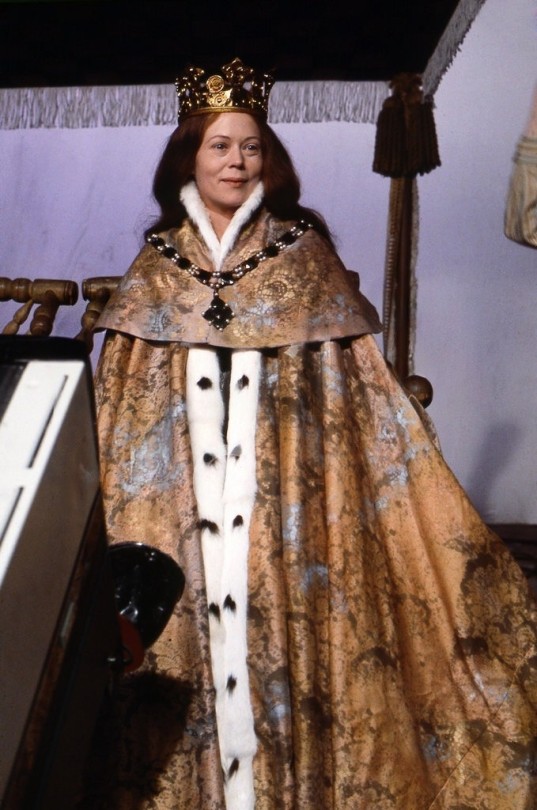
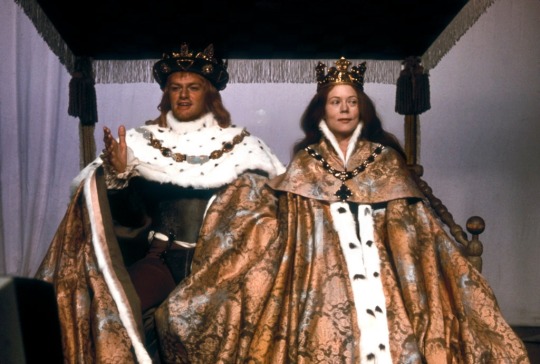
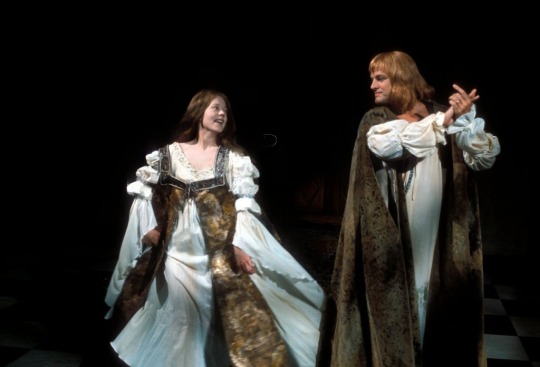
Annette Crosbie as Catherine of Aragon and Keith Michell as Henry VIII in The Six Wives of Henry VIII (1970), Episode 1: Catherine of Aragon (written by Rosemary Anne Sisson)
Edited by me; apologies for any remaining artifacts!
Maria de Salinas (1st pic) was played by Margaret Ford.
#tudor era#catherine of aragon#annette crosbie#henry viii#keith michell#the six wives of henry viii#love how it showed her younger years#bc it rly provides context as to why she fought the annulment sm#in addition to the obvious reasons#maria de salinas#margaret ford
39 notes
·
View notes
Text
can my state stop making national news
2 notes
·
View notes
Text
Dream's Response Summary
Dream posted a response to various accusations, covering just about everything ever because he was done with this shit. I've done my best to summarize it here, but I recommend going and watching his whole video. This is going to be extremely summarized for readability and I'm only going to cover stuff I consider serious so anything about speedrunning is getting skipped.
The tl:dr is: Dream never groomed anyone or had inappropriate contact with anyone underage, he provided proof that one accuser flat out lied, and the other ""accusation"" was from a third party who was never involved. The actual supposed victim released a statement that they were never groomed, nor a victim in any way, never was asked about someone sharing information about them, and wants everyone to shut the fuck up.
Police were never actually contacted, both twitter accounts were lying about doing so to make their claims seem real. Also the supposed snapchat video shown is a very obvious fake.
He covers Manatreed, the run down is the guy was a childhood best friend he grew up with and who was struggling with homelessness. Dream helped him, and never knew about the battery charge (Manatreed had lied to him about it). When Dream spoke to Manatreed's ex girlfriend, she was very clear she never wanted any of this publicly out there, that she was happy that Dream had been helping Manatreed and she wanted the best for him.
Dream still doesn't know exactly what happened with that situation, he has since lost contract with Manatreed, all he knows is he was trying to help a childhood friend and got lied to.
The first allegation from Oxy/Anastasia, he's extremely clear they only ever messaged in twitter dms and he disproves the claim about the texts/tik tok. He has a google voice number hooked up to his tik tok account for obvious reasons, and she was showing imessage texts. This is not possible, which means she was lying.
As part of this, Dream scrolls through his twitter dms and shows he responds to fans all the time and talks to people in his community from all over. He also shows how he's friends with and has hired people that were fans of his, including people like Foolish.
He discusses Amanda, the two of them messaged on instagram back when he was a much smaller creator. He showed/posted the transcript of the two of them talking about normal stuff. They had been messaging since 2020. He did attempt to post a complete transcript of those messages, but she had deleted some of her messages and he doesn't have a way to recover them.
Dream explains that Instagram has a "feature" where if you ever reply to someone, then you literally cannot remove their ability to message you without blocking them. Something I did not know about instagram and which is fucking wild.
Since he replied to her in 2020, that meant she could message him forever and her notifications would be constantly showing up for him. He attempted to delete her messages/her ability to message him back in 2021 and showed proof of this, but realized he couldn't. Dream also in doing so accidentally deleted the context to her messages that she was a fan and basically everything prior to 2021.
Since he didn't remember her (what with the prior messages deleted), she was dmnig him from her personal account without fan content on it and was talking about being a streamer, he assumed she was a smaller streamer he knew and was talking to her as such.
They were talking about music so he gave her his personal snapchat to talk and because he wanted to get some feedback on a new song he was working on. He wanted to send the song via snapchat so he could be reasonably sure it'd stay private.
Dream categorically denies any sexting with Amanda or sexual messaging at all, he goes through why she most likely did this (he had been ignoring her messages and made a new snapchat with only close friends). He also downloaded his own data (something Amanda refused to/failed to do), went through the snapchat logs and did see some messages, but never saw either of his supposed compliments to her.
Amanda claimed Dream deleted her dms and that's why she couldn't provide any of the evidence she claimed she had, but Dream showed those same DMs very clearly undeleted. The dms were never deleted and she lied as an excuse.
Amanda lied about going to the police. Dream had his lawyers file a bunch of requests, and track down the police station that she went to based on the photo. They filed every request possible for any information with this police station, and there was no record of Amanda visiting the station or any records relating to Dream whatsoever. So either she lied about filing anything, or she told a story such that the police filed literally no paperwork whatsoever about the situation. Not even a report.
Dream sent the police station a copy of his own drivers license and Amanda's information so they could contact him if anything did come up, and nothing ever did. Nothing was filed, nobody cared.
Dream got swatted several times as a result of online harassment, including his family, and the harassment was overwhelming and awful for him.
He addresses the gumball situation, he showed up to a birthday party for a friend, gumball's VA was there and kept getting aggressive with him. While on facetime with some friends, Cantu ended up hitting Dream to impress them. Dream was obviously put off by this, but at the end of the night people ended up ubering together and Dream ended up in an uber with Cantu. He thought it'd be fine since other people were involved.
Cantu dropped his phone out the window made the uber driver pull over to look for it and got in trouble with the police. The uber driver tried to talk to Cantu about handling the police in the future, and Cantu started calling the uber driver slurs and claiming the uber driver had "down syndrome".
Dream got involved, trying to defend the uber driver, and Cantu threatened to kill him and called him slurs. Later Cantu apologized and Dream wanted to forgive him. Only later, Cantu started spreading lies about him and calling him a pedophile, so Dream realized the apology wasn't sincere and called him out for his behavior.
The third party who had been filming all of this saw what Cantu was doing lying about Dream and trying to claim none of this happened. They reached out to Dream and gave him the actual video as proof of what happened. Cantu tried to threaten them out of sending Dream the video of what happened, but they ignored him and sent them anyways. Dream also had the uber driver in his video backing up what he said.
Finally, the Jamie Allegations
Jamie is a mutual friend of several people that Dream knew, she did not post the allegations, she was never contacted about any of this she made an explicit statement that she was never groomed or a victim in any way.
Dream and Jamie meet prior to Dream being a youtuber on bbh's minecraft server, they were both fans of Skeppy. Which is why Jamie was followed by Dream, Skeppy, Vurb and some other youtubers in their friend group.
Jamie is still active online and put out her own statement, the person in the screenshots never gave permission for any of this to be put out, and they are very clear that the messages were taken out of context and that the claims made are false. The person in the screens is clear Dream is not a groomer, they never accused him of that, and that the twitter account is lying.
The snapchat video shown is very obviously fake, because snapchat just magically opens itself, there's no finger or button use interacting with the screen.
The burner account never actually contacted the police, Dream records him calling to the department they claimed to contact, and the person answering is very clear they have no contact from this person.
The supposed recent document posted is a fake convo of someone using a fake twitter account to talk to "Jamie", Jamie did not talk to them and it's just fake.
All of this was incredibly damaging for Jamie, who had no idea what was going on, and was getting harassed/stalked/having her irls contact.
Dream has also faced waves of harassment over obviously fake allegations, people have just been taking them at face value. He also shows how easy it is to fake these things as I have done.
He's been swatted, harassed, his family has been swatted and harassed, he's been scared for his own safety several times. It's been awful for him, and all based on fake shit. He's not stepping back from minecraft, but he is stepping back from twitter and no longer engaging with people behaving this way.
Also his ping pong record was undefeated.
#sif speaks#dreamwastaken#dream smp#dream#grooming mention#stalking mention#gumball#nicholas cantu#discourse#video summary#abuse mention
854 notes
·
View notes
Text
in addition to being prone to an obvious naturalistic fallacy, the oft-repeated claim that various supplements / herbs / botanicals are being somehow suppressed by pharmaceutical interests seeking to protect their own profits ('they would rather sell you a pill') belies a clear misunderstanding of the relationship between 'industrial' pharmacology and plant matter. bioprospecting, the search for plants and molecular components of plants that can be developed into commercial products, has been one of the economic motivations and rationalisations for european colonialism and imperialism since the so-called 'age of exploration'. state-funded bioprospectors specifically sought 'exotic' plants that could be imported to europe and sold as food or materia medica—often both, as in the cases of coffee or chocolate—or, even better, cultivated in 'economic' botanical gardens attached to universities, medical schools, or royal palaces and scientific institutions.
this fundamental attitude toward the knowledge systems and medical practices of colonised people—the position, characterising eg much 'ethnobotany', that such knowledge is a resource for imperialist powers and pharmaceutical manufacturers to mine and profit from—is not some kind of bygone historical relic. for example, since the 1880s companies including pfizer, bristol-myers squibb, and unilever have sought to create pharmaceuticals from african medicinal plants, such as strophanthus, cryptolepis, and grains of paradise. in india, state-created databases of valuable 'traditional' medicines have appeared partly in response to a revival of bioprospecting since the 1980s, in an increasingly bureaucratised form characterised by profit-sharing agreements between scientists and local communities that has nonetheless been referred to as "biocapitalism". a 1990 paper published in the proceedings of the novartis foundation symposium (then the ciba foundation symposium) spelled out this form of epistemic colonialism quite bluntly:
Ethnobotany, ethnomedicine, folk medicine and traditional medicine can provide information that is useful as a 'pre-screen' to select plants for experimental pharmacological studies.
there is no inherent oppositional relationship between pharmaceutical industry and 'natural' or plant-based cures. there are of course plenty of examples of bioprospecting that failed to translate into consumer markets: ginseng, introduced to europe in the 17th century through the mercantile system and the east india company, found only limited success in european pharmacology. and there are cases in which knowledge with potential market value has actually been suppressed for other reasons: the peacock flower, used as an abortifacient in the west indies, was 'discovered' by colonial bioprospectors in the 18th century; the plant itself moved easily to europe, but knowledge of its use in reproductive medicine became the subject of a "culturally cultivated ignorance," resulting from a combination of funding priorities, national policies, colonial trade patterns, gender politics, and the functioning of scientific institutions. this form of knowledge suppression was never the result of a conflict wherein bioprospectors or pharmacists viewed the peacock flower as a threat to their own profits; on the contrary, they essentially sacrificed potential financial benefits as a result of the political and social factors that made abortifacient knowledge 'unknowable' in certain state and commercial contexts.
exploitation of plant matter in pharmacology is not a frictionless or infallible process. but the sort of conspiratorial thinking that attempts to position plant therapeutics and 'big pharma' as oppositional or competitive forces is an ahistorical and opportunistic example of appealing to nominally anti-capitalist rhetoric without any deeper understanding of the actual mechanisms of capitalism and colonialism at play. this is of course true whether or not the person making such claims has any personal financial stake in them, though it is of course also true that, often, they do hold such stakes.
537 notes
·
View notes
Text
I genuinely believe that at least part of the reason we're seeing so many people look at older media as "pretentious," is because nobody's teaching it or providing resources to learn about it properly, in a way that's accessible to all.
If you try to sit down and read Ye Olde Classic Lit because you've been told it's Important To Read, but you have zero tools for understanding the archaic language and necessary historical context, of course it's going to feel weird and outdated and pretentious.
Of course you're going to gravitate towards things written in a style and tone that more closely resembles your own modern language--there's a reason for the popularity of things like "No Fear Shakespeare" and "OMG Shakespeare" that translate older literature into modern references and slang (and, yes, emojis). If you aren't taught how to read older literature (or how to watch older films, etc., etc.), then it's not going to make sense!
We don't have an inborn ability to understand language we've never encountered. We need context and touchstones, and if we don't know how to find them, of course we're going to seek out something where the touchstones are more obvious. Of course we're going to feel alienated when people tell us we Have To Read The Thing because it's a Cornerstone Of Culture, but we don't have the tools to understand it. Nobody likes being made to feel stupid and small because they haven't been given the tools to understand a piece of literature.
Incidentally this is why I think Dracula Daily is one of the best things to happen to foster genuine learning and literary analysis in recent memory. People are having fun, because they've been given something to connect with and an accessible way to do it. People are coming together to share their own knowledge and interpretation and associations and ideas. Knowledge is being passed on. New interpretations are coming together. It's fucking awesome. More of this, please.
5K notes
·
View notes
Text
in re: “cas knows dean better than sam”
“cas sees dean as a whole person and sam just sees dean’s façade as his big brother slash parent” but like how and where. outside of your fanfiction. season and episode. scene and line. if it’s so obvious and apparent you should have at least 3-5 concrete examples right? “sam doesn’t know dean carried him out of the burning house” yeah but did cas? outside of a footnote in the angelic manila folder they gave him between seasons 3 and 4 so he could better manipulate him and sam into doing heaven’s bidding? like if you’re going to say “cas knows dean better than sam” than you need to show how cas succeeds where you perceive sam to be failing at the very least. but even your perceptions of how sam doesn’t measure up are so warped, blinkered, and moronic that it wouldn’t even be worth much if you could provide the textual evidence, but at least you’d have a semblance of a point. like say anything without going “as an eldest daughter…” “well my relationship with my sibling isn’t…” please say anything without fucking projecting your own self-pitying crybaby bullshit onto your little woobie dean and using the actual canon text of the show. I’m literally begging you.
like the thing of it all is and always has been that you’re so hell-bent on twisting the sam and dean relationship to fit into this narrow and almost entirely inaccurate mold which is the basis upon which you build the entire Destiel Mythos that you literally lose all sense of media literacy. you don’t even miss the forest for the trees, you miss the trees for like, the pretend invisible things you’re seeing in between the trees, the forest is a whole long way away from your current level of perception. because the Destiel Mythos is based entirely on the fact that dean is Not Seen and Not Appreciated and Not Loved and Cannot Be Himself until cas comes along, and that Family (read: sam) Is Only A Burden on Him That He Must Be Freed From In Order to Flourish, so you keep trying to warp the sam relationship into something that is only one dimension of it – and keep ignoring the ways in which dean is seen, loved and understood within it, because you need to keep lying to yourselves that there is a narrative need to emancipate dean from something that he has never wanted emancipation from because it is ultimately a net good for dean in the particular circumstances of their lives. it’s also profoundly unhealthy, codependent, evil and toxic etc. (a lot more dean’s fault than sam’s but I will nawt be getting into all that right now) but that doesn’t change the fact that sam and dean both know and understand and feel deeply that they are each other’s person – that they know the best and love the most in the world. but that – which IS true canon fact – is incompatible with the Destiel Mythos so it must be ignored and all good sense must be thrown out the window in order to do it.
anyway i digress there are two main categories of Bad Thinking that i will be addressing below
childhood/ “parent/child” / blah blah blah
every single thing people are saying in favour of the deeply stupid thesis in the title of this post is proof positive of the very silly form of ‘analysis’ I just described. a few things:
“wah sam didn’t know that dean carried him out of the burning house :( this means that dean withholds things from sam to protect him because he is a PARENT and sam can only know things about him in the context of him being a PARENT to him” – what the fuck are you on about genuinely. first of all reducing the sam/dean relationship exclusively to parent/child is in itself foolishness for so many reasons that I don’t have time for right now. but also, it’s clear that this is just something that happened when sam was a baby that just never came up. in the scene (1.09) where this is brought up, dean is mildly surprised that he or john never mentioned that detail and then states that sam knows the rest of the story (i.e. the actual traumatic stuff) just as well as dean does – which is true, demonstrably whenever they talk about it.
obviously there are some things that happened to dean in their childhood that sam doesn’t know about (or didn’t know about, until told in whatever episode they come up in). equally, there are things dean doesn’t know about sam’s childhood, e.g. the fact that he was so lonely he needed a zanna (11.08). or how dean didn’t remember that sam was friends with barry cook until he mentions it when they go back to their old school (4.13). or about the nature of sam’s relationship with amy pond (7.03). these don’t mean that ‘sam withheld these things to protect dean out of parental love’ lol, it’s just that there are details and events in each of their lives that the other happens to not have been told about.
similarly “sam didn’t even know dean wanted to be a firefighter L” girl did dean know sam wanted to be a lawyer? in 1.01 he’s pretty surprised that sam has a law school interview. the point here isn’t “neither sam nor dean know each other well,” these are minutiae that aren’t relevant to how well you know someone as a whole, and very poorly demonstrate the bad and inaccurate point that dean withholds things from sam the way a parent does a child (on a constant or regular basis). obviously the way they were raised, sam was deemed too young to know about certain things until he got older and dean had to keep that secret, but as shown in 3.08 flashbacks, most if not all of this is eventually revealed throughout their childhood when sam is still fairly young.
or possibly the dumbest one is that “wah sam doesn’t even know that dean reads books L” whenever that was he was also obviously joking because in more serious moments (e.g. 8.14) he admits that dean is smart/a better researcher than he is, literally remembers dean reading to him as a kid (8.21) so like. clam down
one of the extra annoying variants of this type of ‘proof’ covers things that are very clearly novel pieces of information about dean that dean, sam, and the audience are learning about dean in real time. like if you’re actually watching the show to comprehend it as it was intended to be comprehended, instead of funnelling everything through the Destiel Machine until it’s unrecognizable slop that fits neatly into your pre-ordained molds that Make Destiel Necessary In the Narrative (when it actually isn’t, at all) it’s abundantly clear. the top two worst offenders:
“sam didn’t even know that dean is good with kids :( he doesn’t even realize that dean raised him :(” first of all you people need to understand that parentification does not literally create a parent-child dynamic between siblings but I digress – this doesn’t make any sense bro. in 1.03 dean admits he doesn’t know any kids as an adult. dean being good with his own kid brother when they were both kids is to any reasonable person not necessarily linked with him being good with other random kids when he’s an adult. in 1.03 it’s clear that dean himself is a bit surprised that he’s able to connect w/ lucas so well because he’s clearly not dealt with a lot of kids since sam grew up. the whole point of this is that dean, sam, and the audience are all sort of seeing a new side of dean. who again is just 26. after this very early episode, there’s no question from sam that dean is able to connect w kids. sam being a bit surprised by this also has absolutely zero connection with him not understanding or realizing that dean looked out for him when they were both kids – sam is standing there at 22 years of age talking about adult dean and children – of fucking course he doesn’t mean himself are you stupid.
from the very first season, sam is very clearly aware of everything dean ~did for him~ when they were kids, see e.g. 1.21: “Dean...ah...I wanna thank you. […] For everything. You've always had my back you know? Even when I couldn't count on anyone I could always count on you. And I don't know, I just wanted to let you know, just in case.”
and 1.06: DEAN: Well, I’m a freak, too. I’m right there with ya, all the way. (SAM laughs.) SAM: Yeah, I know you are.
and then possibly even more stupidly, the one where it’s like “wah sam doesn’t even know dean can cook :( he doesn’t even know that DEAN was the one making him food as a babe in arms :(” – when sam is surprised that dean made something fairly gourmet and from scratch literally the first time they have ever had a permanent living space with a functional kitchen. in this VERY scene (8.14), dean himself points out that they haven’t had a kitchen before and when sam remarks on the irregularity of him doing serious cooking, he says “I’m nesting”, clearly showing that this is a novel development because they now have a kitchen, and that it’s irregular relative to past behaviour – both of them acknowledge this. because real proper in-depth cooking and making box mac and cheese for sam until he was like 11 and old enough to be left alone are two different things, which sam understands because he’s smart, unlike whoever chooses to make this point. dean never showed significant signs of liking to cook before this, which is what the exchange is about, but he did have to prepare food for them both when sam was too young – of course sam knows he had to, there are childhood memories referred to (e.g. 14.11) where sam is mentioned to literally help dean do the cooking as kids lol (and yes, genius, sam says ‘I didn’t know you knew what a kitchen was’ or something to that effect, but if you think he’s being 100% literal there I have an oceanfront property in Kansas to sell you)
again, obviously there are pieces that sam doesn’t know about dean, e.g. when he’s talking about his response to mary dying in 1.03. but again, Sam is 22, dean is 26, the last time they were in regular contact was when sam was 18-20, these are things that happen when people grow up, they’re able to reflect and share on childhood experiences if they’re close with their siblings as adults. it’s clearly not something that 26 y/o dean wanted to hide from 22 y/o sam. yes sam didn’t know everything about how dean felt when they were young, but that’s equally true in the other direction, and it’s such an irrelevant point in this discussion when, crucially, sam does learn these things about dean mostly fairly early on in the series (i.e. when they’re really not that deep into adulthood yet). cas was also not magically blessed w/ knowledge about dean, he also had to learn whatever it is that he knows, but somehow sam has to know everything about dean from age 7 or it doesn’t count when it’s sam lol.
“sam doesn’t know the One True Dean / doesn’t see through his facades”
the next branch of defending this flawed thesis is invariably that sam has little idea of the fronts and facades that dean puts up and is content to just believe them, whereas cas digs deep and sees the One True Dean that stupid sam always misses. there is nothing in the text that demonstrates this is true. multiple times, we see sam being very knowing of the fact that dean puts up fronts and facades. sam is also knowledgeable of the way dean perceives himself, and – demonstrated in multiple episodes before such sam lines were very poorly recycled and regurgitated into cas’s dialogue in 15.18, but keep acting like that was the first time anyone ever showed that they knew the One True Dean.
Obviously there are times where sam teases dean when he’s being more touchy-feely than usual, but 9.99 times out of 10 (as a conservative estimate in case there's something i'm forgetting otherwise i would say every time) that’s very clearly coming from a place of knowing the real dean vs. the façade he puts up because that’s the whole joke. and it’s allowed to be a joke because they’re siblings and that’s what siblings do lol. esp since sam and dean have touchy feely moments at the end of like every episode.
examples of all of the above off the top of my head (there are more than these, but these are the ones I can think of):
2.02 (about John’s death)
Sam: “I mean this ‘strong silent’ thing of yours, it's crap. […] I'm over it. This isn't just anyone we're talking about, this is Dad. I know how you felt about the man.”
Dean: “You know what, back off, all right? Just because I'm not caring and sharing like you want me to.”
Sam: “No, no, no, that's not what this is about, Dean. I don't care how you deal with this. But you have to deal with it, man. Listen, I'm your brother, all right? I just want to make sure you're okay.”
2.03 (Sam to Dean, also about John’s death): “You know, you slap on this big fake smile but I can see right through it. Because I know how you feel, Dean. Dad's dead. And he left a hole, and it hurts so bad you can't take it, but you can't just fill up that hole with whoever you want to. It's an insult to his memory.”
Note that Dean essentially admits that Sam is right in these two instances in 2.04 bc I know yall have stupid shit to say about john too that has nothing to do with how anyone actually felt about him in canon
3.07 (about Dean’s demon deal – also proven true in later episodes)
SAM: Dude, drop the attitude, Dean. Quit turning everything into a punch line. And you know something else? Stop trying to act like you're not afraid.
DEAN: I'm not!
SAM: You're lying. And you may as well drop it 'cause I can see right through you.
DEAN: You got no idea what you're talking about.
SAM: Yeah, I do. You're scared, Dean. You're scared because your year is running out, and you're still going to Hell, and you're freaked.
DEAN: And how do you know that?
SAM: Because I know you! […] Yeah, I've been following you around my entire life! I mean, I've been looking up to you since I was four, Dean. Studying you, trying to be just like my big brother. So yeah, I know you. Better than anyone else in the entire world. And this is exactly how you act when you're terrified. And, I mean, I can't blame you. It's just […] I wish you would drop the show and be my brother again. 'Cause... (can't find words; tears in his eyes) just 'cause.
5.18 [Sam figures out what Dean is doing re: his plan to let Michael possess him, tracks him down, and eventually is the catalyst for Dean ‘making the right call’, which he predicts] – e.g.:
SAM: No, you won’t. When push shoves, you’ll make the right call
DEAN: You know, if tables were turned…I’d let you rot in here. Hell, I have let you rot in here.
SAM: Yeah, well…I guess I’m not that smart.
DEAN: I—I don’t get it. Sam, why are you doing this?
SAM: Because… you’re still my big brother.
8.14 (basically the o.g. version of whatever went on in 15.18 + sam intrinsically understanding the trials are a death wish for dean): “I'm closing the gates. It's a suicide mission for you. I want to slam hell shut, too, okay? But I want to survive it. I want to live, and so should you. You have friends up here, family. I mean, hell, you even got your own room now. You were right, okay? I see light at the end of this tunnel. And I'm sorry you don't – I am. But it's there. And if you come with me, I can take you to it. […] I AM smart, and so are you. You're not a grunt, Dean. You're a genius – when it comes to lore, to – you're the best damn hunter I have ever seen – better than me, better than dad. I believe in you, Dean. So, please – please believe in me, too.”
10.22 (understanding how much dean has ~done for him~)
SAM: I'm saving my brother.
CASTIEL: You told Dean—
SAM: —I know what I told Dean. Cas, look. I've been the one out there, messed up and scared. And alone. And Dean—
CASTIEL: He did whatever he could to save you.
SAM: Yes. I mean, it's become his thing. I owe him this. I owe him everything.
10.23 (basically the o.g. version of whatever went on in 15.18, x2 – from Sam to Dean): “You were also willing to summon death to make sure you could never do any more harm. You summoned me because you knew I would do anything to protect you. That's not evil, Dean. That's not an evil man. That is a good man crying to be heard, searching for... some other way. […] You will never, ever hear me say that you -- the real you -- is anything but good.”
11.13 (Sam understanding exactly how Dean feels about Amara being his ‘deepest desire’, and confirming that it doesn’t make him a bad person)
Dean: Why? Because if she is that means that I’m…
Sam: Means you’re what? Complicit? Weak? Evil?
Dean: For starters, yeah.
Sam: Dean. Do you honestly think you ever had a choice in the matter? She’s the sister of God, and for some reason she picked you and that sucks, but if you think I’m gonna blame you or judge you…I’m not.
Dean: You know that I want her ass dead.
Sam: Yes. Of course. And I know you’ve also probably beaten yourself up a hundred times over it, but where has that gotten us? (Long silence) Just how bad is it?
13.02 (Sam perfectly explaining Dean’s psyche to Jack)
JACK: Is that why Dean hates me?
SAM: Dean doesn’t hate you. It… Look, sometimes the wires in Dean’s head get crossed and—and he gets frustrated, and then he mixes frustration with anger, and—and fear.
JACK: Why would he be afraid?
SAM: Because Dean feels like it’s his job to protect everyone. And right now, we need to protect you. But we may also need to protect people from you.
14.03 [Sam assesses Dean’s psychological/emotional response to the Michael possession; end of episode, Dean confirms that Sam’s assessment was fully accurate]
14.10 [Sam is the only one able to snap Dean out of his weird Michael mind loop by using their code word]
14.11 [Sam figuring out that something is troubling Dean just based on the fact that Dean hugs him]
15.17 (self explanatory at this point)
DEAN: Chuck has to die. He has to! Otherwise he'll keep us tap dancing forever, and I can't live like that, man! I can't live like that! I won't!
SAM: I know you feel like that right now, okay. I know you do. But you gotta trust me. My entire life, you've protected me— from Dad, from Lucifer, from everything. I didn't always like it, you know, but... it's the one thing in the whole world that I could always count on. It's the only thing I've ever known that was true. So please... put the gun away. Just put it away, and we'll figure it out, Dean, we'll find another way, you and me. We always do.
like maybe there are some cas moments w dean along these lines too. i don't know, i don't remember what the guy says or does anymore it's been too many years and he is not memorable. but the point is where and in what capacity and based on what metric other than the amount of bad fanfic you've read does cas exceed sam in these respects.
so basically just. genuinely, what are you people literally ever talking about. go watch the show instead of saying stupid wrong stuff about sam on the hellsites all day. or watch another show (please for the love of god watch any other show this one is absolutely lost on you and it’s such a stupid one too i'm embarrassed for you)
#sorry i wasnt gonna be able to sleep otherwise my blood pressure got too high#sam winchester meta#sam winchester#anti destiel#sam and dean#whatever else my tags are#haven't done this in a minute#i'm sorry for being a cunty sam stan (tm) in this but have you considered we'd be nicer if you ppl were less dumb#this is not proofread it's not real meta
347 notes
·
View notes
Text
news spreading and expulsion

One pro to the light novel adaptation of TWST is more in-depth explanations for the consequences that play out. The game kind of sweeps over this, as there’s reasonable suspension of disbelief for the medium. However, in a book or mainly text-heavy form, there has to be a more pragmatic sequence of events to fill in the gaps in logic. (For example, Yuuya takes on a more explicit and active tole as a tactician in battles, there is more description about how the OB boy behaves, and just more general detail about fighting with magic overall so as to not make the OB fight scenes boring to read.) As a pragmatic person myself, this has made me really appreciate the light novel and what it does for the TWST lore!!
Another example of this is the dorm leader meeting in book 2 following Riddle’s OB. There’s a whole conversation (that’s 100% unique to the light novel only) in which the other dorm leaders have dialogue that implies they’re aware Riddle OB’d and that he should be recovering right now. People constantly whisper and stare at him, hurting Riddle’s pride. In other words, there are more obvious social consequences on display for OBing. We also get unique text which describes the pain associated with the aftermath of Overbolt.
OH YEAH AND??????? Riddle actually faced expulsion from NRC, which is NEVER brought up in the game. The only reason he could stay was because his mom put up a fight with the school administration… which is very Mrs. Rosehearts of her, but that also kind of implies that the staff told her or provided a reason as to why Riddle was being removed… MEANING SHE MIGHT KNOW ABOUT HIS OB????? 😭 But maybe not the reasons for the OB… If Mrs. Rosehearts did have all this knowledge beforehand, then it changes the context for Riddle resolving to speak with her in book 4 (during winter break). Like, Riddle would now be confronting his mom knowing that she’s aware of what he did, and knowing that he’s still indebted to her since she’s the reason they let him stay. That must place so much more guilt and shame on his shoulders, making it all the more difficult to discuss with her.
It’s crazy how these extra scenes in the light novel can recontexualize so much with so little new content… I love it 🥰
#twisted wonderland#twst#twisted wonderland light novel#twst light novel#Riddle Rosehearts#Kuroki Yuuya#Yuuya Kuroki#disney twisted wonderland#notes from the writing raven
879 notes
·
View notes
Note
Ok. So…you can’t just put potential Rosie HeadCanons in my face like that and NOT expect me to start gushing girl.
Rosie with a reader who has a powerful instant regeneration ability. Just imaging they chop off a limb or some fingers and offer them up to Rosie like - “Flame grilled or Sushi?”
Being cute while she’s devouring their pinkie finger while having tea, and reader is SO nonchalant about it.
Good evening my dear! Rosie is just munchin' on the reader like a snack.

Warnings!!
Cannibalism [Fun fact, this is one of the main warnings in the fics I write, out of context this is concerning, EVEN WITH CONTEXT ITS KINDA CONCERNING??] mild gore for obvious reasons, temporary self mutilation??? The seasoning of limbs I don't know but this gets weird, as per usual this more then likely isn't proofread, I wrote headcanons and a drabble but this is somewhat short my apologies!

You and Rosie's relationship is odd to say the least, I mean y'all are in hell but still, but it's healthier then the majority of relationships down there,
I imagine you just carry around like a butcher knife so whenever Rosie is hungry you just go CHOP and hand her your hand or something,
Also if you carry around a bag I imagine you put some seasonings and sauces in for her to choose as well, because unseasoned meat is gross.
Rosie seems like the type to season her food.
The first time you popped off a limb you did with without warning and almost scared Rosie half to double death!
Give the gal a warning and tell her that you can regenerate limbs! She did enjoy munching on it afterwards though!
If you're an overlord you supply her with snacks at meetings,
She just whispers to you that she's hungry and that after the meeting you should get a meal,
And then you with zero discretion chop off a finger and offer it to her,
Carmilla Carmine wasn't pleased, neither were the other overlords [excluding Alastor, he finds it entertaining] and that's saying something since they've more then likely done horrendous things to get to their overlord status.
Rosie however is pleased with the snack, she would prefer if you didn't get blood on the table though,
Maybe in advance you go chop chop and put fingers in a Ziploc bag and hand it to her like it's baby carrots.
Less mess that way,
During tea time I imagine you do prep work in advance so you have an assortment of your fingers in different flavors, so your hand is mess free to be able to hold Rosie's hand while sipping tea,
Or maybe having a picnic, you just pop off an arm and thinly slice it and put it in a little sandwich, maybe some type of dessert? I don't know
Similar to the Alastor biting headcanons I did, Rosie bites you,
But unlike Alastor she doesn't just break skin, she takes CHUNKS OUT, I image you either have a really REALLY REALLY high pain tolerance or you can't feel pain because this has to be painful.
Also you probably need to have towels nearby because this gets messy, like it looks like a murder scene, but without the murder.
You are a snack, literally, a walking talking snack that Rosie adores with all her cannibalistic heart.
....................
You hummed as Rosie sat nearby sipping tea, it was a decent day in hell, the sky was red, sinners were screaming in the distance, and you were pulling back a meat cleaver to provide more fingers,
"Rosie darling, Should I take out the bone or leave it in this time?"
"Leave it in, it gives the fingers a nice crunch!"
Rosie said looking at you, grinning her sharp teeth shining like a razer sharp knife, eyes like a endless void of pitch black that one could get lost in, you could wander in and never escape.
You were completely and utterly in love with her,
Giving a lovely smile back you nodded before ramming down the cleaver, spattering blood across the counter, you pulled your now fingerless hand back, giving it a slight shake before a swirl of black smoke covered it and within seconds you had fingers again, you pull back the cleaver to repeat the process, after all your beloved Rosie was hungry and five fingers wasn't much!

Good evening folks! Thank you for tuning in!
I never thought I would be writing cannibal x readers but here we are, anyways I'm still working through requests! I got a Found family Rosie, an parental Alastor, an angsty Velvette and another one that I can't remember but It's in the drafts! Also Alrighty tune in time!
#hazbin hotel x reader#hazbin hotel x you#hazbin rosie#hazbin rosie x reader#hazbin hotel rosie x reader#hazbin hotel rosie#rosie x reader#rosie x you
140 notes
·
View notes
Text
Individually and together, Loki and Mobius personify Chaos + Order. Their relationship and love is the balance the TVA needs.

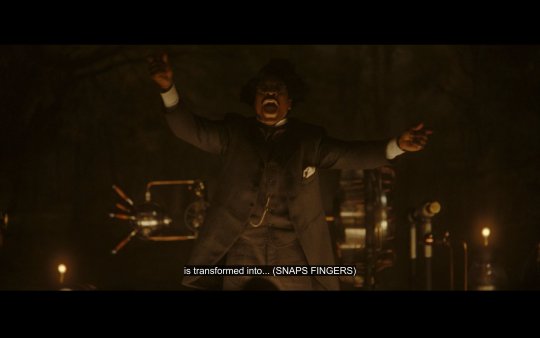

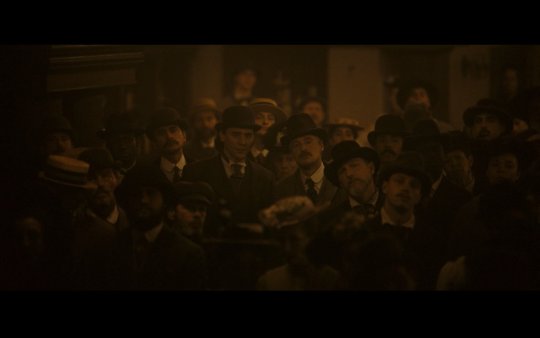
Victor is talking about the temporal loom, AND this is related to Loki and Mobius' relationship.
Yes, Loki is chaos and Mobius is order... except they each have a little of both principles in themselves because of each others' positive influence.
They've grown together, they've changed each other, and that's why they're the key to saving everyone and everything.
It can never be only chaos or only order. It's about both.



The TVA was only order, initially.
And when He Who Remains wanted it run by Loki and Sylvie, it was "pure chaos" – as Mobius predicted when deriding the idea of them together, which is partially why they are fundamentally incompatible.
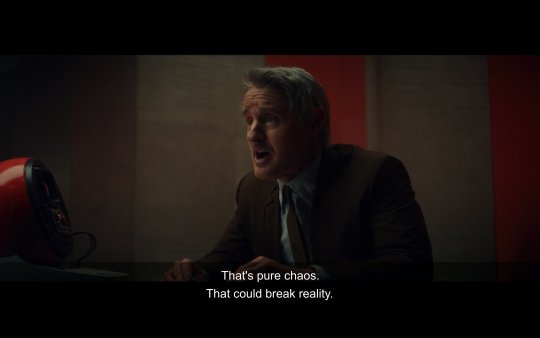
Neither was sustainable, and neither can be the TVA's future.
(A few days ago I was talking about chaos and order and said "in episode 6 they’re gonna be back at the citadel, and it’ll include Mobius, and Loki’s gonna pick up his dagger in a lokius context, and they’re gonna commit to co-running the TVA (maybe with B-15) and also kiss. Meet in peace at the end of time for order + chaos, let’s GO" so you can imagine how thrilled I was by these themes making a blatant return in this episode lmao)
This is spelled out here too, of course:

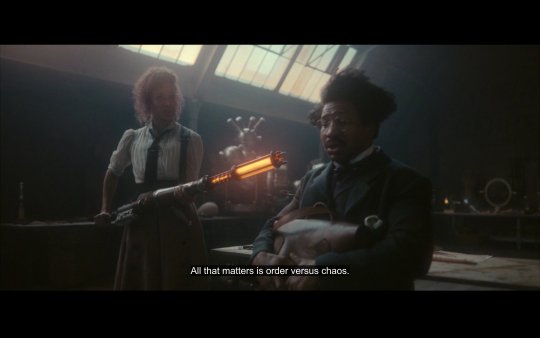

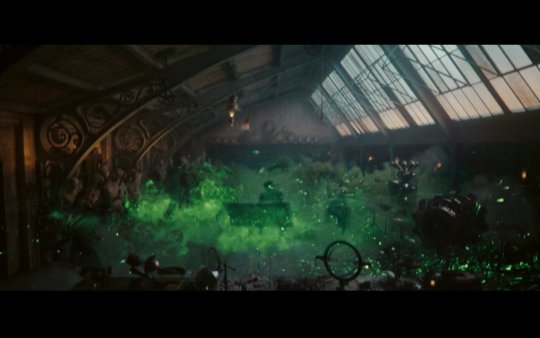
Ravonna personifies only order, while Sylvie personifies only chaos. Hence why they've been at odds from the start, which kickstarted this whole thing when Sylvie was taken by the TVA.
But...
"All that matters is order versus chaos" isn't true.
"When will you learn that none of your words mean a thing?" isn't TRUE.
Mobius' words were the catalyst for Loki to change – hence the framing during that line – and the ways they personify order and chaos as a result is in a partnership rather than in a battle.
The equal relationship and love between Mobius and Loki is ACTUALLY all that matters in the end.
As a bonus, this episode even provided a pitch-perfect microcosm of evidence that, per usual, Mobius' words mean everything. They're vital.
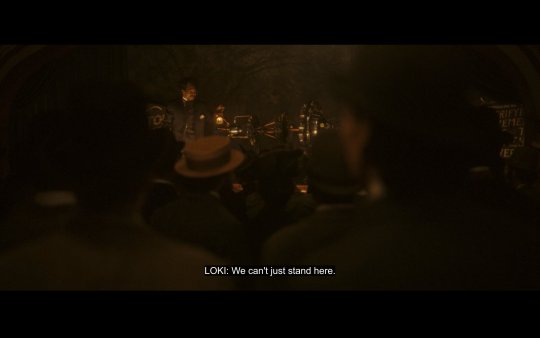
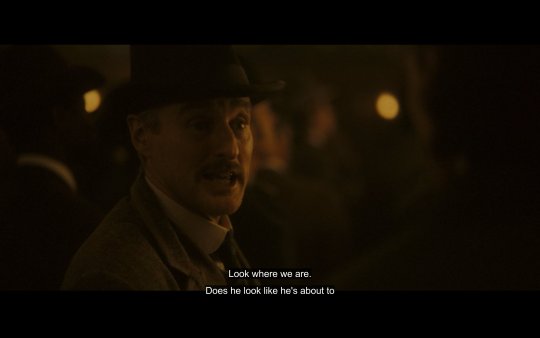
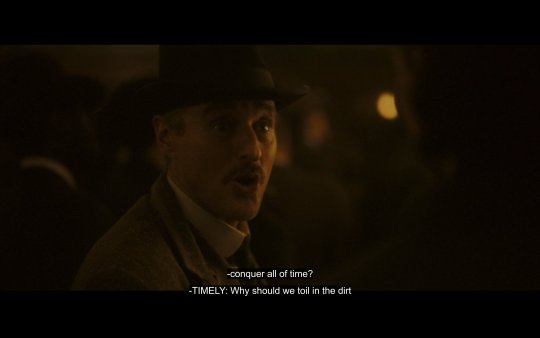
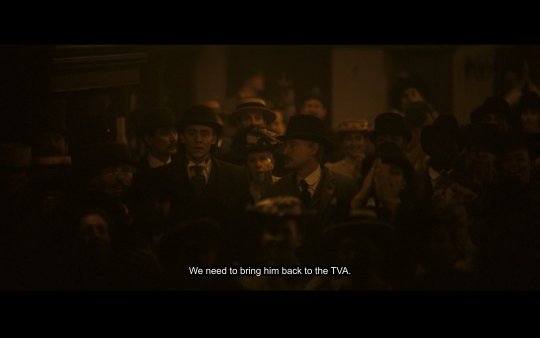
^^^^ This is what happened in the show at large, but condensed.
Loki was ready to do something rash, like maybe killing Victor Timely. He was panicking. Mobius talked him down, and Loki immediately saw sense and they began to work together to help instead of harm.
Loki, changed by Mobius, then stands in front of Sylvie and tries to keep her from killing.

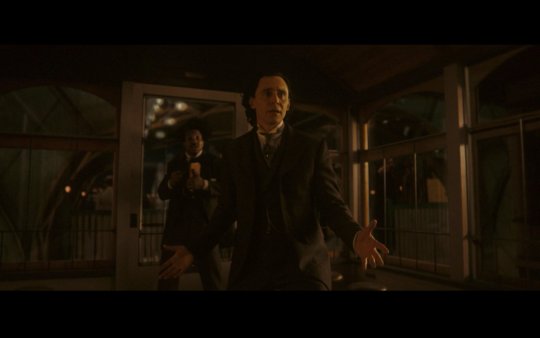

He tries to get her to stop and think. She doesn't listen and he cannot change her.
It's EXACTLY what happened in the season 1 finale. And it happens on a wheel. 🌀
What actually changes Sylvie and gets her to listen is Sylvie seeing herself in Victor, which I LOVE.



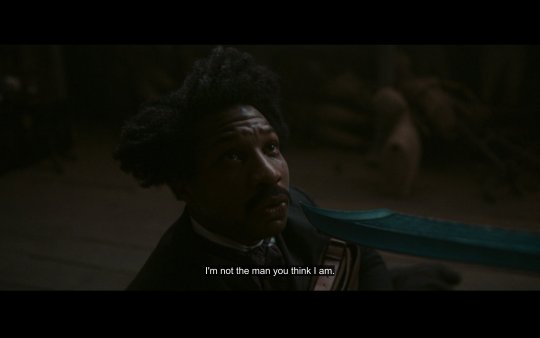
All Sylvie wants is free will. Victor asks her for that. If she kills him – "prunes him" for being a Variant – she'd be no better than the old TVA.
So... one last thought (for this post, at least):
Mobius' slow, deliberate, cerebral approach – coupled with his words – is what Loki needs.
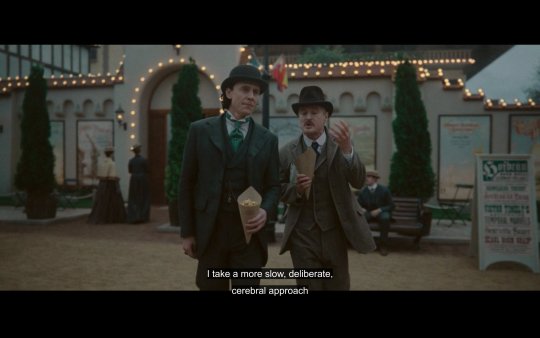
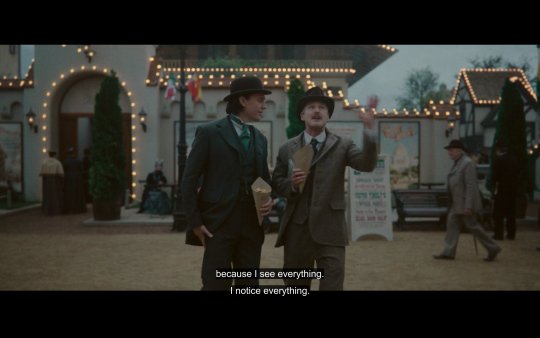
But Mobius needs him just as much for many reasons, including the fact that sometimes Loki sees the obvious that Mobius DOES miss :)

Chaos and order in harmony.
This is a love story, as always.
And now that love story is explicitly irrevocably tied even more to the plot.
---
My Loki metas on Tumblr are under the tag “chars loki posts.”
218 notes
·
View notes
Text
Analysis: Another perspective into Sonetto and Vertin's complicated childhood relationship using new information from Green Lake.
We know Vertin and Sonetto were not on good terms after the frog event in the hallway but after playing through Green Lake, I think Vertin still tried to befriend Sonetto. She didn't give Sonetto things from the outside world, but instead she shared her toffees. Even if they didn't speak much (Vertin mentions this when Sonetto gave her notebook. It's rare for Sonetto to talk to her first), this says volumes about their relationship to me.
Vertin, who's love language is giving/providing, found a way to give Sonetto things without making her mad. Perhaps it was more than her being nice. She wanted to befriend Sonetto, but she didn't know how to bridge the gap since her interests are the main reason they don't get along. They had nothing to bond over, but Smoltin did her best to build something. Sonetto also didn't hate the brat, but she didn't like the rule-breaking. She accepted the toffees because they didn't break the rules.
During the Green Lake event, we see Sonetto decipher Jessica’s learning style and modify her lessons around it. Sonetto is very observant.
Back to Vertin and Sonetto's childhood, What if Sonetto knew Vertin was trying to bridge the gap because giving is how she shows affection? She didn't care about the flavor. In fact, she admits she can't remember what they tasted like. But they were a gift from Vertin and she accepted them instead of breaking her heart again.
Vertin was trying to mend things but she wasn't the charismatic Timekeeper then. She was a kid who really wanted the girl sitting next to her to talk to her. She's genuinely surprised when Sonetto comes to her first after the Parade Protest, which ngl breaks my heart.
She couldn't fathom Sonetto checking up on her because she assumes Sonetto doesn't like her. Placing that into context, she “knew” Sonetto didn't like her, but Sonetto “likes” the toffees she shares with so she continued to share. The pining is real.
Unlike everyone else at the Foundation, Sonetto isn't a victim of her cheeky comebacks. Vertin is unusually quiet and soft spoken when she talks to Sonetto by time the Parade comes around. There's no playfulness in her tone or dry humor.
But her efforts were not in vain. Sonetto was highly aware of her deskmate.
When Vertin was hurt, what did Sonetto do after they spoke again?
She gave Vertin her notebook.
Sonetto isn't like Vertin with a bunch of random crap in her pockets to share, but she shared something very dear to her and wrote little notes to her in the margins. While Vertin was in a coma, Sonetto annotated her notes with the intention of Vertin reading them (can be found in Ch3 Atlas). She even left a little get-well-soon message at the end. The highly focused, no nonsense Sonetto wrote annotations in a way someone like Vertin would understand by associating them with things she might be familiar with. She's trying to speak Vertin's language because she gets that one part of her deskmate.
She is trying to wrap her head around Vertin too, even if it's not obvious in her interactions.
Vertin still has the notebook Sonetto gave her.
Moving on, Vertin might learn in a similar fashion to Jessica. Afterall, Sonetto's notes were effective at keeping her out of the guardhouse.
Vertin is a tactile person. Sonetto teaches Jessica about tangible cognition in a way similar to the notes she gave to Vertin through associations.
It's frustrating to think how much these two understood each other yet kept missing the mark because of the Foundation! Also, we can see Sonetto was distracted in some of her notes when Vertin was no longer at her side. Vertin was always a distraction, especially when she's not around.
Sonetto wanted Vertin to succeed. She wanted her to stop getting punished and just listen to the Foundation. However, once Vertin's made up her mind to leave Sonetto fights by her side, because she in fact does care about Vertin. She doesn't understand her completely, but she gets that this is important for Vertin.
And maybe at the back of her mind, seeing Vertin shot down in front of her finally planted that seed of doubt.
Sonetto never tattled in game, but she threatened to. Why? Because Vertin was going to get punished and she wanted to prevent that. Unfortunately, she couldn't. I wonder if that frustrated her? Did she see the bruises when Vertin shared her toffees after seeing Tooth Fairy? Did she feel helpless? Angry? If she's observant, she must have seen them.
In hindsight we can see TWO IDIOT CHILDREN WHO NEEDED TO HUG IT OUT.
#reverse 1999#vertin#sonetto#why does it get sadder every time#i wonder how vertin felt when she learned Sonetto wanted toffee#im gonna fail my exam#what is sleep
127 notes
·
View notes
Text
i know it’s been said on here plenty of times but i genuinely get so upset when i see people continuously perpetuate the whole “Gehrman’s a creep and the Doll is a sex object theory” when there’s an actually direct in-game evidence showing that none of that is true. and yk what despite the posts abt this that already exist i am, in fact, gonna make one of my own.
Okay so first off, The Voiceline. You know the one.
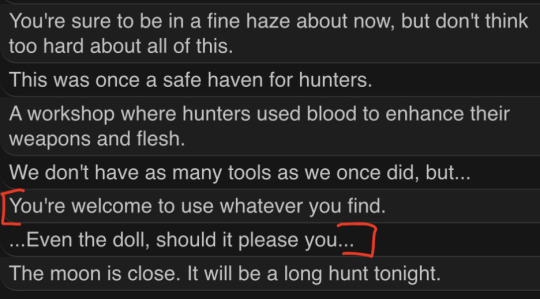
Yeah this line got interpreted by a portion of the fandom as weird, especially because of the tone it’s said in. However, there are two pieces of context that immediately show what he meant by this.
The first, is that you DO use the Doll. She provides a service for you by taking your blood echoes and turning them into your strength (the level up system).

Aside from this, the ability to talk to her, and the option of giving her an item, there is nothing else you can do with her, and nothing else the game even implies you can do with her. She does not even have any truly “romantic” dialogue. She mentions that she loves you, but that she does because she was created to do so.
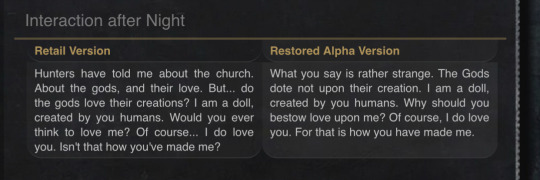
She loves all the hunters because her purpose is to care for them, and in her words, embolden their sickly spirits.
The second piece of context is in Gehrman’s dialogue just before he says the line about the Doll.

He is telling you that anything you find in the workshop is a tool you can use to strengthen yourself and make the hunt easier. He is referring to the Doll as a tool, because she is one of the few the workshop has not lost. He’s not sexualizing her, he’s talking about her like she is a tool, and something to be used, not seen as a person.

Is it a good thing? No, but considering he resents her for not being what he created her to be (or by another interpretation, coming to life when he never intended her to), it’s not unreasonable to assume that over time he would just categorize her as a thing instead of a person.
The second piece of evidence towards this god awful theory is the Doll’s white blood. Honestly I cannot believe people genuinely take this as being semen, because not only is there a canon reason for creatures to have pale blood, but also it’s just disgusting.
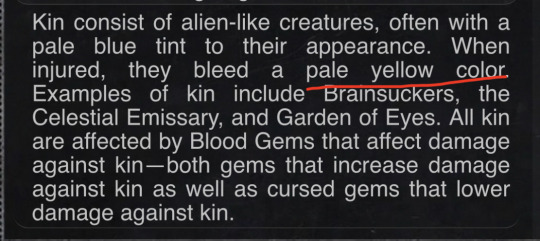
You need a minimum of one insight to see the Doll during the game, she was given life by the Moon Presence following Gehrman’s placement in the Hunter’s Dream, and she bleeds pale blood. She’s kin. (Yes I am aware the game does not consider her kin in regards to whether or not she can be dealt damage based gems that alter your attacks vs kin, but you’re not supposed to be fighting her anyway, and it’s not like you need a bonus to kill her in the first place).
And finally, to address the other big point, the item descriptions that appear on Maria’s Hunter Garb and the Doll’s Set.

I would like to address first, the obvious, that Maria’s garb says directly she was “unaware of his curious mania” (however you interpret that), but the point is she was unaware, he clearly in life, never made advances on her (which is something I’ve seen a few people state is ‘implied’???).
The second, and this one is a bit in the subtext, is that the Doll seems to not have any idea that Gehrman ever had any positive feelings towards her at all, she expresses a love for the hunter in a way that reflects someone who was never shown love in any capacity (likely due to the circumstances surrounding her achieving sentience), so its reasonable to assume as well that she was entirely unaware of the ‘curious mania’ as well.
Additionally I would point out that while referencing Gehrman’s mania once more, the Doll’s description also directly states that she was once loved and cared for, something that changed after she gained sentience. She likely served as a memorial for Maria, considering there is no canon evidence Maria herself actually has a grave.
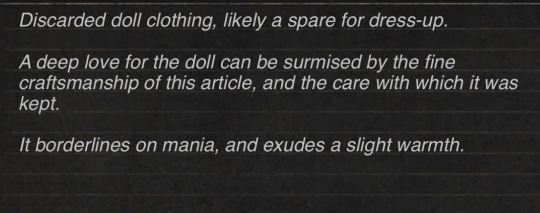
The grave that provides the Old Hunter Bone may be hers, but the item description refers to the hunter it came from as “he.” This could be due to it being placed there prior to the decision to give Maria the quickening skill in her boss fight, or it could be that Maria did not have a proper grave for whatever reason, and thus the Doll was needed, which could then relate the obsession to an obsession with Gehrman keeping a memory of her, as there is nothing else he seems to have of her.
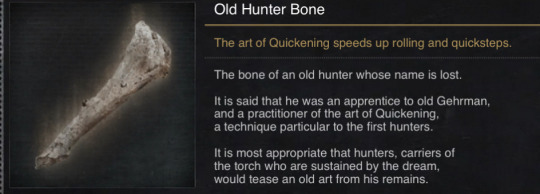
Everything here aside I would like to also point out that the Doll is quite literally, a doll. There is nothing that would even suggest she would be capable of any sort of sexual relationship.
Especially because even before the Dream, the Doll did have a specific purpose. She seems to be modeled after Victorian mourning dolls, which were items used to help families/loved ones process grief, typically of children, by having something to remind them of the deceased that did not itself look deceased. If you consider the grave in the Abandoned Old Workshop to be Maria’s and know that that’s also where the Doll is in the waking world, then that’s probably what she’s for. Or as stated before, the grave may NOT be hers, and the Doll itself IS her grave.
Another thing I didn’t point out but will, for a moment get into, is the Doll’s clothing being feminized. A lot of people take this as Gehrman being a misogynist and sexualizing her in a more feminine way as if he himself was not training Maria (and likely other women) to be hunters during his life. He encouraged the less feminine life she lived as a hunter!
That point always confuses me, especially knowing that one of the last things Maria likely said to Gehrman was what she said after the massacre at the Fishing Hamlet where she threw away her weapon and renounced the hunt, choosing to retire (and potentially become a caretaker for the Church’s patients, judging by her role in the Hunter’s Nightmare). Like OF COURSE he dressed her like that, she expressed that she no longer wanted to be a hunter so he made her the opposite. The only reason she is dressed the way she is in the Hunter’s Nightmare is because that is how Kos is depicting her, not because it’s her conscious choice.
The point of this is, Gehrman is one of my all time favorite characters alongside Maria and the Doll, and while yes, I am well aware he isn’t perfect, it’s still frustrating to see him get so mischaracterized by a fandom who insists they love lore so much, and care about the tiny details. You can dislike Gehrman or think he does shitty things and that’s fine, but creating a story where he’s a creep just to prove you care about Maria and the Doll is weird. And it’s weirdER that people argue IN FAVOR of the theory as if it MUST be true, because honestly why would anyone even want it to be???
This post also was specifically done without consideration for whatever type of relationship Gehrman and Maria had according to canon or any interpretations. Essentially I’m not necessarily saying any of this has anything to do with whether or not you ship them, I personally don’t, but I know some people do, and I feel like on either side you can still be critical of this Doll theory, as it is entirely baseless.
(In case anyone is interested, the images and references used for this were from the Bloodborne wiki, specifically this one.)
#bloodborne#gehrman the first hunter#lady maria of the astral clocktower#the plain doll#debunking my least favorite theory#sorry i saw someone say smth abt it and got frustrated so i wrote this at 2am and then instantly passed out#bloodborne theory#bloodborne lore#mistakes and spelling or grammar fuckups are due to this being written when i shouldve been asleep#if i see one i’ll fix it later
93 notes
·
View notes
Text
The Gish Gallop was a term coined I think on the 2000s internet for a rhetorical maneuver where to buttress an argument you provide a ton of low-quality evidence; that the evidence is bad means it should be easy to refute, but the very large volume means it will take much longer to explain why it's all wrong than it did to copy-paste a bunch of links, and to a certain kind of very naive onlooker, it looks like the galloper is winning--after all, the one interlocutor has presented a ton of evidence! The second interlocutor has to spend so much time bending over backwards to refute it! Surely the first guy is more knowledgeable and authoritative. You aren't going to look at all that evidence yourself, of course--who has the time?
But listening to Dan McClellan talk about the Gospel of John this morning, it occurs to me that I don't think this is disingenuous. Not entirely. I think this is just the style of argumentation a lot of Christians (of a particular religious flavor) are used to. And I'm not just talking about in non- or para-religious matters like evolution. This is how Christianity understands the Bible.
This week's Data over Dogma is about the theology of John, and why it is non-trinitarian (because the Trinity is a much later doctrine developed as a kind of political compromise, maintained only because it had state backing) and does not actually identify Jesus with God (the theological developments are more complicated here; but suffice it to say it was not at all a given that "authorized bearer of the divine name" and "actually God" were the same being in 1st century Hellenistic Judaism, and indeed the distinction between the two had developed in Jewish thought precisely to avoid the awkwardness of anthropomorphic figures proclaiming themselves God in some of the older sections of the Hebrew Bible).
The funny thing is, there are a ton of passages in John that get trotted out as proof texts that Jesus is God. There are very good reasons in the case of each one to doubt that that is actually the correct reading; but of course, if you don't know anything about Greek, all you have are modern translations produced under the assumption of the dogma of the Trinity--mostly for devotional readers of the Bible who would be outraged if the Trinity wasn't in the New Testament--and you have been raised in a cultural and/or educational milieu where it is simply a default assumption about the way the world works that the Trinity is a timeless concept that has been in the Bible from the beginning, it sure looks like one side is spinning up tendentious arguments based on silly semantics that have nothing to do with the religion you learned as a kid.
But this exegetical approach (really, eisegetical) is common to many topics in traditional Christian theology. There are a ton of passages from the Septuagint that the Gospels warp to be about Jesus, even though, in their original context, this doesn't make any sense; sometimes even they're based on obvious mistranslations, like having Jesus ride into Jerusalem on the back of two animals simultaneously because you don't understand appositives. And you can poke holes in any individual bit of this exegesis, but psychologically having a ton of low-quality evidence for a thing is a pretty effective bulwark against thinking critically about that evidence; for every individual argument you knock down, the person you are arguing against is probably thinking, "yeah, but what about all that other stuff," even if they can't actually name all that other stuff in the moment.
And it's not mendacious! This is the stuff of true belief; this is how you get breathless Christian commentators saying the Bible couldn't possibly be written by human hands, because it so perfectly predicted Jesus even in the Old Testament--and the evidence they point to is, to anyone not steeped in traditional Christian exegesis, and especially to Jews who have their own exegetical traditions, absolutely barmy. Like really pants-on-head crazy stuff. But of course even now it is still being processed, in many parts of the world, through a two thousand year old tradition trying to reconcile it all and to normalize it all, and--to bring it back to discussions of evolution on the internet in the 2000s--I can't help but think of all those people who talk about the experience of thinking evolution was so obviously nonsense, because all they were exposed to was the fundamentalist strawman of it. When they finally sat down and began to read about it on their own, from unbiased sources--often with the intent of criticizing it--they realized how distorted their understanding was, and how limited their supposed outside view.
(If there are general lessons to be wrung from this situation, I think it's simply "beware of echo chambers." Social consensus in a bubble can make bad arguments feel much stronger than they really are, especially if you are not exposed to the actual opposing view. Be on guard against mistaking "quantity of evidence" for "quality of argument," especially if you're not gonna evaluate that evidence yourself. Also all religious traditions are fundamentally eisegetical, because in order to keep holy writ relevant to the community its meaning has to be constantly renegotiated. So, uh. If you want high-quality exegesis, ask an academic, not a theologian.)
89 notes
·
View notes
Photo

Writing Mysteries for tabletop games
It’s no wonder I’ve had a lot of requests for how to write mysteries, compelling adventures that account for the party’s choices are hard enough to write on their own, to say nothing of what happens when the challenge you’re having them face off against is meant to be a brain teaser. Mysteries are difficult to get right, too obvious and it’s not a mystery at all, too difficult and your session will run up against a brick wall. Finding that middle point isn’t just a matter of gearing the numbers a certain way or preparing the right number of clues, it requires doing a certain amount of work to understand the story of the mystery as a mechanism both in its initial construction and in how it’s presented to the party.
Characters: At it’s core, solving a mystery is a character study, how the life of a perpetrator led them to have a particular set of drives and restraints, and how a very particular set of circumstances led to those drives running wild and destroying other people’s lives in the process.
The cast: notice how the previous entry referred to characterS? A mystery is an ensemble piece and since a person can generally remember up to seven things at once, it means you get to include up to seven detailed or semi-detailed characters to play with in your drama (including victims). That isn’t to say that there can’t be bit players in your story, but its a good idea to associate them strongly with one your main cast. For each major character you either have to give them a reason why they’d want to commit the crime, or a piece of evidence that ties them directly to it. Likewise, they all need to have a secret/hidden motivation, which will guide how they act as the mystery proceeds.
Placing clues: mysteries leave clues like a bomb leaves shrapnel, with the tricky business being that a good portion of it ends up buried in the wall and it’s hard to tell which bits are the bomb and what parts are just the mundane objects that got caught up in its explosion. Again, following our rule of 7, we can further set out that about half of the clues at each stage of the investigation will be hidden, while another will be obvious, while separately 2/3rds of the clues are going to be either red herrings ( complete dead ends) or only be helpful in fully discounting one of the suspects.
On the Clock: Taking a page out of my own advice when it comes to running a fancy ball, you’re going to want to have your mystery plot occur over a strict timeline, which will change who’s available to talk to and what clues are revealed over the course of the investigation. Generally time sensitive evidence will be worth more, while evergreen evidence will exist to provide context to other clues, or need to be paired together to make real progress. Shifting the timeline along also means that NPCs can enact their own plans, whether it means pursuing their own investigation, altering, uncovering, or destroying evidence, or attempting to escape.
Wheels within Wheels: Often mysteries are nested together, as the fallout of one wrongdoing goes on to provide the motivation for another. A party who’re investigating will likely receive evidence that’s a jumble of their main mystery and its nested mysteries, and by solving these lesser steps the party can either shed a light on motives or help discount other avenues of search.
Consequences: Just like every other d&d adventure, one of the most important steps is making the party care about the adventure and its outcome. They have to be at risk of losing something they care about, or have already lost it and are looking for revenge. This can be anything from a promising job opportunity, their reputation, an npc they enjoy the company of, or their own freedom. Likewise, you need to have an idea what happens if the party fails to solve the mystery. How does it affect the heroes, or the characters that are part of the mystery, or the world at large?
Feel free to check my mystery tag for more inspiration for your own games, or my dm advice tag for more of my highly specific ramblings on how you can become a better dungeon master
#drafting the adventure#drafting an adventure#dnd#dungeons and dragons#d&d#5e#dm advice#dm tip#dm tips#dm tools#writing advice#pathfinder#writing prompt#mystery#how to run mysteries
581 notes
·
View notes
Note
I can’t remember which post it was off the top of my head but you’ve mentioned how George was explicit that nothing in The Clone Wars directly influences Anakin’s fall to the Dark Side, what about indirectly? There’s the obvious one: Anakin finds it easier to give into his anger as the war goes on. But I was also thinking the events of Hardeen and Wrong Jedi arcs weaken Anakin’s trust in the Order that then plays into the circumstances in which his fall to the Dark Side took place. Like that weakened trust meant Anakin distanced himself which gives context for why he refused to go to Obi-Wan when the visions started.
It also fits with his character because one of Anakin’s flaws is that he takes things way to personally, e.g. he was not the only person the Council lied to about Obi-Wan’s fake death. Then when Ahsoka was leaving the Order after the Council let her down, which they did let her down, she had to remind Anakin that it was about her not him.
Of course weakened trust is nowhere near enough to cause someone to commit genocide and Anakin didn’t seem to make any effort to mend those fences either. And of course none of this would have happened without Palpatine manipulating things. Hence my question of how you think The Clone Wars indirectly influenced his journey to the Dark Side even as none of really tied to why Anakin ultimately fell.
I think you summed it up perfectly, actually.
If you're using Lucas' word as the "be-all, end-all", then The Clone Wars is indeed just an asterisk/addendum to the story of the films.
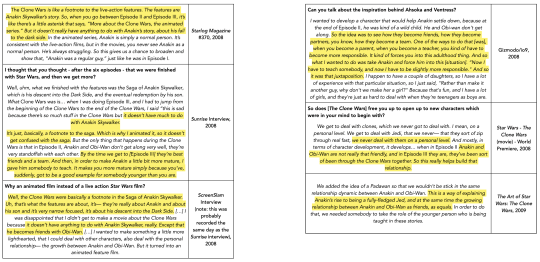
Its purpose? Providing context for the minor changes between Episode II and Episode III, changes that aren't exactly relevant to the story of Anakin's downfall.
"Anakin seems more mature and less whiny, in Episode III, what happened to change that?"
He got a Padawan of his own during the Clone War and when you're put in charge of someone, you grow up real quick.
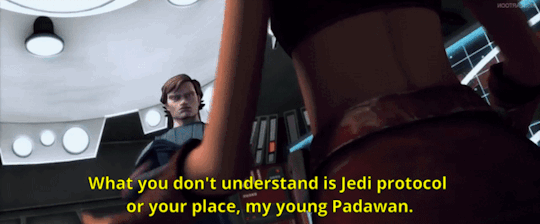
"He and Obi-Wan were constantly bickering in Episode II, now they're best buds, why?"
In Episode II, Anakin was in Obi-Wan's care but felt he needed to leave the nest, whereas Obi-Wan was being a helicopter parent. In The Clone Wars, we see that once Anakin gets knighted, their relationship smooths over, now becoming a more brotherly bond than a parent/child one.
Obi-Wan will sometimes worry that Anakin will fly off the handle, but he's also able to recognize his former Padawan is now his own man, whereas Anakin takes responsibility more frequently, now, due to now having a Padawan of his own.
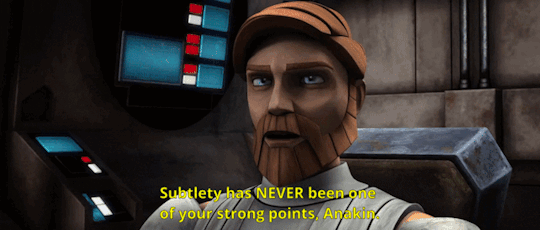
"What's the relationship between Anakin and the other Jedi we saw in the background of the movies?"
Find out by tuning in to The Clone Wars!

"The clones have names, now? And they're the Jedi's friends, when did all that happen!"
You can find out by seeing them fight side-by-side with the Jedi and slowly becoming independent thinkers, only in The Clone Wars.

"The Jedi are more scheming and political in Episode III, they and Anakin are at odds... why the shift in attitudes?"
They were drafted into a war, and forced to make compromise after compromise to a point where their values have been rendered pointless and they've become begrudging hypocrites. They're playing politics (and sucking at it) because they've been dragged onto a political chessboard and are trying to keep up with a far more skilled opponent. These terrible decisions impact all of them, even Anakin.
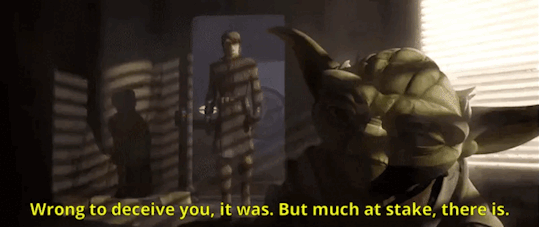
Stuff like that.
But none of that is relevant to Anakin's story, which is more personal, in nature. It's a story about how his own greed turned him into the very thing he swore to destroy, which parallels how the Republic became the Empire for those same reasons.
The films show us this, and The Clone Wars *reinforces* this narrative by giving us further examples of it.
While Anakin is aware of what's right and wrong... the more the war rages on, the more frequently he takes the "easy" path and gives in to his anger and selfish desires, enabled by Palpatine.

Sometimes Anakin does manage to get a grip, he does manage to take responsibility, he does learn to let go... but then something happens (often orchestrated by Palpatine) and he goes right back to square one... then square zero... then square minus one, etc.
He never takes that final step to being a more enlightened person.

The Clone Wars challenges the Jedi at times, questions their actions... but ultimately, the responsibility falls on Anakin's shoulders. The series will show you moments where they fail Anakin, but there's as many moments of him failing them.
Could the Jedi have done more? Yes. But if you think them doing more would've solved the problem, you're missing the point of the story of the Prequels.
Functionally, all that is achieved from the Council/Anakin conflict (again, orchestrated by Palpatine), in Episode III, is creating more pressure for Anakin to cave under. That's it.
They're not a meaningful factor in his turn to the Dark Side.
Padmé is.

When he's hesitating between saving Mace or saving Palpatine...

... he's not thinking "one of them was nice to me, but the other one was mean to me and kicked out Ahsoka, so I'll chop his hand off".
And he's not thinking "this isn't by the book, Mace you hypocrite!"
Lucas tells us what's going through his head, in that moment.

It's about Padmé living. And we've already established that what that's really about is "Anakin not wanting to live without her". So, really, it's about Anakin.
Mace and Anakin butting heads isn't even considered. If Mace had been laughing with Anakin and hugging him on the daily, Anakin still would've ended up chopping off his hand. It wasn't about Mace, it was about Anakin.
If Ahsoka had stayed with the Jedi Order, he still would've joined the Dark Side. Because it was never about Ahsoka, it was about Anakin.
If Qui-Gon had lived, Anakin would've still turned. It was never about Obi-Wan or Qui-Gon being the teachers, it was about Anakin.
Because the message of the story is basically that:
"Ultimately, it's up to you to take personal responsibility and be compassionate. If you avoid responsibility and give in to your darker impulses for selfish purposes, bad shit happens. The only meaningful change can come from within."
And in Anakin's case it didn't. He zigged instead of zagging at almost every turn.
Now, you can agree or disagree with that message. But that's what it is. Even some of the current Star Wars authors acknowledge this.

The story of Anakin Skywalker is told in the movies.
The Clone Wars is there as an addendum to:
Shine a spotlight/provide context on minor changes between Episode II and Episode III.
Humanize Anakin, to further drive the point that what happened to him can happen to anyone.
ADDENDUM:
#yes this IS the post I had written last night then lost by *gasp* pressing Ctrl+Z ???? AKA the tumblr nuke button!#george lucas#jedi order#anakin skywalker#QnA#obi-wan kenobi#star wars#long post#meta#collection of quotes#lucas quotes#attachment#pro jedi
370 notes
·
View notes
Text
Myths to Avoid When Writing Torture
Fiction makes, implicitly or explicitly, some kind of argument. A fictional portrayal of a guy simply going for a walk might make the argument that walking is a nice activity to do. This might not be a particularly earth-shattering message, but messages like this are implicit within the literary tools we use in how we portray characters, behavior, settings, and relationships. This underlying argument – a theme – is present in all of fiction. It’s why you’ll often see people make the statement that “all art is political”. And when it comes to torture – a subject which in and of itself has been the topic of political debate for millenia – how we approach the ideas and arguments made within fictional depictions of torture warrant, in my opinion, a degree of care. Torture isn’t just something that happens in movies. It is something that happens today, to real people, on a global scale. It’s not even particularly rare.
The difficulty with the subject of torture specifically is that for the past two decades, the public perception of torture has shifted on a global scale, seen most clearly in how torture is presented in contemporary media, fiction or otherwise. Everybody believes these myths. And getting indoctrinated into having reactionary takes on a topic is nobody’s fault, considering that almost every source outside of academia feeds you misinformation. But that’s, y’know, kinda why I made this blog: in the hopes that I might be able to get people to consider what ideas they’re presenting in their writing.
I want to start out by briefly reitorating some basics of how torture apologia typically works within political discussions, because this very much is relevant to how you can avoid accidentally sending the wrong message.
The first thing you need to understand is that the real-life debate surrounding torture isn’t framed in terms of whether or not torture is good or bad – everybody, including torturers themselves, will concede that it is bad. The more insidious argument is that torture is useful for achieving certain goals, and that it is therefore justified in extreme emergencies. Not only does this argument try to soften the usually rigid negative framing of torture in moral discussions, but it also seeks to poke holes in the international laws which ban the use of torture outright. It’s a moral, political and legal argument all wrapped up in one reactionary package. For this reason, having the theme of “torture is bad” doesn’t always mean a piece of writing isn’t making use of torture apologia. “Torture is useful” serves that goal just fine.
Torture is also often discussed in terms of civility – not the civility of the torturers, but the civility of the victims. It’s the argument that the people who are being tortured are bad people, and therefore don’t warrant the respect and dignity we usually offer to other human beings; they are so bad, essentially, that it’s fine for us civilized people to war crime them. Whenever I’ve encountered this argument, it has usually been presented in a way that was, shall we say, sussy as fuck – some even give up the pretense and straight up call their victims “savages” or “degenerates”. I hope I don’t need to explain why this line of thinking is insane, but in any case, it’s just my way of getting you to consider that a lot of the myths surrounding torture are rooted in broader sociopolitical issues, often racism and religious discrimination, and historically, most often within the context of colonialism.
With that in mind, let’s get into the myths, starting with the most obvious one.
"Torture for information works."
Every study I’ve read has concluded that torture is counterproductive when it comes to gathering intel from reluctant sources. Under severe pain or distress, victims are more focused on saying whatever they think the torturer wants to hear to make the torture stop, as opposed to providing accurate information. On a neurophysiological level, severe pain or distress actually interferes with the pathways of the brain relating to long- and short-term memory; this means that torture in and of itself is likely to destroy the very evidence it sets out to gather. Furthermore, victims are less likely to cooperate if subjected to physical abuse, including torture, and nothing in the infliction of pain itself works as some kind of truth serum. Lying and defiance are more likely under torture.
To a large minority of people, portraying torture as a reliable tool for gathering accurate information will make the implicit argument that torture, although usually bad, can hold utilitarian value in certain exceptional cases. I’ve written about this more in depth here.
"Under torture, everyone cooperates sooner or later."
French prosecutors used torture in the events leading up to the French revolution, as a way to gain forced confessions from suspects. Their failures and successes were jotted down, leading us with a pretty revealing insight – the highest success rate for gathering forced confessions was in Toulouse, an exceptionally high 14%. In Paris, only 3% of suspects cooperated long enough to sign their name – the rest did not. This is one of the primary reasons that the French criminal justice system eventually dropped using torture for intelligentsia. To quote Darius Rejali, who wrote The Book on torture: “Torture the clumsiest method available to organizations.”
So no, not everybody talks – in fact, rough estimate, 90% of torture victims never do. Defiance is by far the norm with torture.
"When the bad guy does it, it’s torture – when the good guy does it, it’s a tough, but morally justifiable decision."
The road to hell is paved with good intentions. Heroes of stories, especially in the action genre, often engage in the use of torture for information, usually following the framework of the ticking bomb scenario, a thought experiment based on the false notion that torture works as an interrogation method. Here, torture is turned into a heroicact, one that speaks to the toughness of the person who uses it. Ask yourself if you want to frame torturers though this lens – because if you do, you are literally justifying the act torture, and, y’know, you do you, but I am gonna call you stupid and reactionary. Torture done by a “good” person is just as abhorrent as torture done by anybody else.
"Some methods of torture are less severe than others."
This myth stems from governments trying to downplay the use of certain methods of torture, and usually goes hand in hand with euphemistic redefinitions of the concept, such as the CIA’s “enhanced interrogation methods,” also known as “torture lite,” or the Israeli “coercive interrogation.” The methods that have been proposed in this supposed less severe category of torture includes stimulated drowning, also known as waterboarding, as well as caning, beatings, limbs being broken with clubs, sleep deprivation, stress positions (ex. forcing a person to crouch against a wall for extended periods of time,) mock executions, sexual assault, and more. If these things all just sound like torture to you, it’s because they are. There is zero evidence to suggest that any torture methods, including those that leave no physical mark on the body, have less severe outcomes than those that do not – on the contrary, non-physical torture methods, including mock executions, or witnessing the torture of a loved one, have been ranked by victims as causing equal amounts of psychological distress as physical torture.
"Torture only causes harm to the person who is being tortured."
This is incredibly unrealistic. Torture is an act that is destructive in all directions, causing trauma to victims, their family, witnesses, and even torturers themselves. It disintegrates the structure of the organizations that use it, it breeds resentment and hatred in the communities around it, and it radicalizes people into extremism. Pretending that consequences like this don’t exist isn’t torture apologia per se, but if your aim is to show the realistic outcomes of torture, these are some of the things you need to consider.
Torture is portrayed as “scientific”; torturers are “skilled” in the “art” of torture.
The most common methods of torture in use today are: hitting people, sleep deprivation, and starvation. These don’t require a whole lot of brain power to conjure up, in fact the infliction of intense suffering is very straightforward. Human beings are full of nerves. Stick a knife anywhere, and I’d be more impressed if it didn’t cause pain.
Not to mention, portraying torture as “scientific” or something that “requires technical skill” makes the implicit argument that torture works for its intended use, here under the condition that you should at least do it right – which brings us right back to that utilitarian fallacy.
"Torturers are expert interrogators, and possess an extraordinary ability to detect lies in their victims."
Studies have been done on the ability of police officers to detect lies for about four decades now. The average person will have a 57% accuracy rate, meaning they’re barely better at spotting deception than a coin toss. For police officers, the highest estimate is around 65% - but it might also be as low as 45%, meaning they might be less accurate than a coin toss – even though police officers tend to think of themselves as exceptional at spotting deception. The same trend is seen in torturers.
In fact, this myth in particular originated from torturers’ accounts of how they conceptualize themselves, which is not only false, but also cringe. When an interrogator starts making use of torture, their focus tends to shift away from gathering reliable information, and more towards “perfecting” the infliction of pain, which means that over time, those interrogative skills are substantially degraded – they are terrible interrogators. So torturers are no better at spotting lies than your average person; they might actually be worse. They can’t read minds, and they don’t possess some secret mystical knowledge about the psychology of their victims.
"You can train someone to resist torture."
Loads of intelligence agencies and revolutionary groups around the world have published material that supposedly serves as manuals for resisting torture, but the truth is, torture is so extreme, there really is no way to prepare or train someone to “resist” it; this is something that even the CIA has acknowledged. Everybody’s reaction to pain will be different. There is no way to predict how torture will affect anyone, much less give them instructions beforehand that will somehow magically negate those effects.
"Brainwashing through torture works."
Torturers can’t change the emotional framework of a person through the infliction of pain. They cannot change the strongly held beliefs and opinions held by their victims through the infliction of pain. They can’t erase someone’s entire personality or make them a ‘blank slate’ through the infliction of pain. They can’t predict how a victim responds to torture, much less direct that response to their own benefit. This is not how pain works.
This is not only an implicit argument for the usefulness of torture to change someone’s behavior or force religious conversions, but the myth that torturers have some form of control of their victims even after the torture has ended is also used in real life to paint survivors as dangerous or unstable, and thereby bar them from treatment and aid, and even to allow access into countries to escape the circumstances that facilitated their torture in the first place. That last point is why you often see the advocacy of refugee rights in organizations that work to prevent torture; these two branches of activism have a huge overlap.
Torture victims cannot be controlled by their torturers. Brainwashing isn’t real.
"Stockholm syndrome is real."
This is a derivative of the brainwashing myth, which means all the connotations previously mentioned remain, but as a cherry on top, Stockholm syndrome as a trope can also serve as an implicit argument for the utility of domestic abuse. So that’s cool.
If you deliberately inflict suffering on someone, that is guaranteed to make that person dislike you. In real life, torture survivors not only tend to be extremely resentful of their torturers, but they also tend to be resentful of anyone belonging to the same demographic as their torturers, whether that be ethnicity, nationality, or even gender or general appearance. Like I said, torture radicalizes people.
"Torture makes people obedient."
Any physical abuse or neglect, including bad cell conditions, access to medical aid, decent food and clean water, is likely to breed resentment in victims and makes them far more reluctant to cooperate with their aggressors. With torture, defiance is the norm, by far. You saw this on a larger scale in the war on terror, for example – turns out that carpet bombing a country to deter terrorism only radicalizes the civilian population, producing more terrorists. No form of violence exists that will make a person particularly eager to shut up and do what you want them to do. It will just make them hate you.
The notion that torture makes people obedient is also an implicit argument for the use of corporal punishment or as crime deterrence, something that along with capital punishment has repeatedly been proven false by sociological studies. People just do not function like this. If you want to create obedience in your story – violence is the last thing you should use.
"People “break” under torture."
Victims of torture sometimes make the conscious decision to do what their torturer wants them to do, and this often serves as a means to buy enough time to plan an escape, or mount up whatever act of defiance they can manage. Sometimes they simply do it to get the torture to stop – this, too, is a tough, conscious decision. If you want to consider this a form of “breaking”, by all means go ahead, but implying personal weakness or lack of willpower in torture victims rubs me the wrong way. I personally see it as a rational choice made by a person who is in an otherwise impossible situation.
"Torture survivors are “broken”."
Torture certainly can lead to extreme psychological distress, but again, the term “broken” here implicitly makes the argument that torture victims simply lacked the mental fortitude to withstand their trauma. In my opinion, there’s a certain degree of victim blaming involved with framing torture survivors in this way, and certainly, it’s a framing that inherently strips away their agency.
Another thing that rubs me the wrong way is the fact “brokenness” implies a degree of permanence and rigidity to human beings that simply isn’t there, as if we are solid objects that, once shattered, can never regain the function we once had. It’s a nitpick, but I view people as organic things, capable of healing and growth – not as glassware.
Conclusion
I’d wager that while reading this, a good portion of you recognized some of these myths from depictions of torture in fiction; that’s not particularly surprising to me. These myths aren’t just widespread, they’ve been engrained in the global public perception of torture by decades of political debate and government propaganda, and as a result, have seeped into popular culture.
Torture isn’t rare, and neither is torture apologia. According to Amnesty International, 31% of the global population believes that torture is justified “in some cases”; as of 2014, AI had also reported on torture or other ill treatment in 141 different countries, despite the fact that torture is internationally recognized as a war crime.
In an ideal world, the subject of torture in fiction is treated with the same due diligence with which we have learned to portray subjects like homophobia, sexual assault, and racism; because, to be fair, all of these things have the capacity to intersect, and very often do. The first step in that regard is to spread awareness about how torture actually functions, which is what I hope to slowly start doing on this blog. At the very least, I hope I can make people more aware of how they choose to portray torture in their writing.
#nonfiction#torture#torture apologia#ive got plans to write about all these things more in depth at some point#so if you see sth you would like me to elaborate about by all means let me know
57 notes
·
View notes